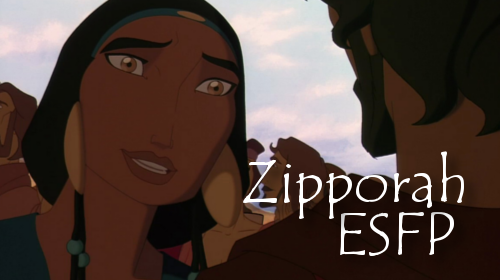ESFP, The Performer, The Activator, The Challenger
I made a big stink when I started this series about the characters in The Prince of Egypt actually being portrayed as brown. That applies to the way they appear on screen, but not necessarily for the actors who give them their voices. Of all the actors playing major characters in The Prince of Egypt, I can only think of two who actually have Jewish heritage–Jeff Goldblum as Aaron, and singer Ofra Haza as Moses’ biological mother Yocheved. What do you think? Does it matter in a medium like animation who the voice actors are, or is it enough that the characters are drawn as ethnically-appropriate?
Today’s character, Moses’ wife Zipporah, was voiced by Michelle Pfieffer, who’s just about as white as can be. I wouldn’t have thought of her for the role of as tough a character as Zipporah, but then at the time the movie was released, I still hadn’t seen Batman Returns. Or Dangerous Minds. I’ve fixed only one of those in the years since.
But enough about the actress! Let’s meet the character!
Dominant Function: Se/Extraverted Sensing, “Experience the Experience”
Zipporah springs into action in response to every situation she encounters. She shows no doubts or second thoughts about her actions, and completely trusts her impulses. We first meet her fighting back against her captors when she’s presented as a gift to the Princes of Egypt. Not long after, she’s tied up her guards and run off into the night.
It’s a long time before we see her again, and when we do, she leaps into action to help Moses out of the well he’s fallen into. The moment she realizes it’s him, she drops him right back into the well.
Eventually, once she sees Moses showing a true change in character, she takes the initiative to get him to dance with her. In the commentary for The Prince of Egypt, the filmmakers reveal that the traditions of the time would have made it inappropriate for an unmarried man and woman to touch each other. Zipporah gets around this by wrapping a scarf around Moses and pulling him into the dancing circle with her.
I believe the term is, “You go, girl!”?
Zipporah feels a strong connection to her environment and the world she knows with her senses. When Moses tells her of his encounter with God, she’s hesitant at first to share his excitement—an encounter with a deity who spoke out of a burning bush seems too far outside her experience. Once she understands how important Moses’ task is to him, though, she immediately decides to go with him.
In the end, after the Hebrews have crossed the Red Sea, and Moses is brooding over the loss of his brother, Zipporah prods her husband out of his reverie to show him how happy everyone is: “Look at your people, Moses. They are free!”
Auxiliary Function: Fi/Introverted Feeling, “Evaluate the Experience”
Zipporah carries herself with a strong sense of inner dignity. She’s knows what right and wrong, and what has value and what doesn’t, without anyone having to tell her. When her captors order her to show the Princes of Egypt the respect they deserve, she declares, “I am…none!”
Zipporah only warms up to Moses once she sees him acting authentically. She’s very attuned to the difference in character Moses shows as he sheds his old identity and finds his new self. She especially appreciates him entertaining her little sisters. Though she initially doubts his mission after his encounter with God, once she understands the moral purpose behind it—freedom for his people just as her people enjoy—she joins the mission as if it were her own, and backs Moses up all the way.
Tertiary Function: Te/Extraverted Thinking, “Organize the Experience”
Zipporah has no trouble putting her physical impulses to immediate action, or speaking her mind. Even as a captive of the most powerful family in Egypt, she doesn’t back down. She’s a shepherdess, so she’s accustomed to responsibility. She takes charge of the situation when her sisters are trying to rescue Moses from the well, and takes the initiative to woo her soon-to-be-husband. She even makes the decision to put him in charge of the flock. She declares that she’s going with Moses on his mission, and won’t be refused.
Inferior Function: Ni/Introverted Intuition, “Anticipate the Experience”
Though she’s the daughter of the high priest of Midian, Zipporah doesn’t show much of a spiritual side until nearly the end of the movie. The destruction of the plagues weighs heavily on her, as it does everyone, and she quietly joins Miriam in the song, “When You Believe.”
She sings of losing hope and then somehow finding it again, “Seeking faith and speaking words I never thought I’d say.” It’s an experience she doesn’t quite understand and doesn’t know how to fully express, since the foresight of Introverted Intuition isn’t her forte. She’s a grounded, take-action-now kind of woman, but her journey with Moses has opened up a new way of experiencing the world, of seeing a bigger picture that her life is a part of.
It’s good to see a physically capable and quick-acting female character in the movies who doesn’t need to be “tamed” by the end. In fact, the one instance where Moses does get the upper hand on her, ending in her humiliation before the royal guests at the feast, happens at the beginning of the story and serves as early evidence that Moses actually has a conscience. In order to grow as a person, Zipporah doesn’t need to give up the power of her active Extraverted Sensing, but, like most of us, just needs to become aware of a bigger world beyond the one she knows.




